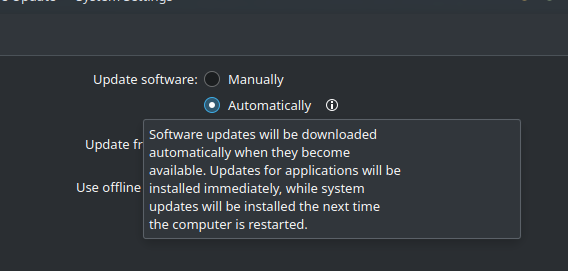#1 is just not being the default for 99% of devices. If someone gets a new computer, why would they go through the effort of installing a new os when the one it comes with works fine? Hell, I bet at least 50% of people in the market for a pc don’t even know what an OS is.
I bet at least 50% of people in the market for a pc don’t even know what an OS is.
70%*
Based on my tests on my family and friends, the main problem is tech support. Most geeks seem to assume other people want the same things than themselves (privacy, freedom, etc). Well, they don’t. They want a computer that just works.
Overall when using Linux, people actually don’t need much tech support, but they need it. My father put it really well by saying: “the best OS is the one of your neighbor.”
I apply few rules:
-
The deal with my family and friends is simple: you want tech support from me ? ok, then I’m going to pick your computer (usually old Lenovo Thinkpads bought on Ebay at ~300€) and I’m going to install Linux on it.
-
I’m not shy. I ask them if they want me to have remote access to their computer. If they accept, I install a Meshcentral agent. Thing is, on other OS, they are already spied on by Google, Microsoft, Apple, etc. And most people think “they have nothing to hide”. Therefore why should they worry more about a family member or a friend than some unknown big company ? Fun fact, I’ve been really surprised by how easily people do accept that I keep a remote access on their computer: even people that are not family ! Pretty much everybody has gladly agreed up to now. (and God knows I’ve been really clear that I can access their computer whenever I want).
-
I install the system for them and I make the major updates for them. Therefore, if I have remote access to the system, I pick the distribution I’m the most at ease with (Debian). They just don’t care what actually runs on their computers.
-
When they have a problem, they call me after 8pm. With remote access, most problems are solved in a matter of minutes. Usually, they call me a few times the first days, and then I never hear from them anymore until the next major update.
So far, everybody seems really happy with this deal. And for those wondering, I can see in Meshcentral they really do use those computers :-P
I think people sell themselves short with regards to having undue access to family members’ computers. If they’re willing to give it then you’ve clearly demonstrated that you’re trustworthy and haven’t given them reason to assume you’ll snoop or worse steal from them.
-
New user: I have a problem 😊
Everyone:👍
- are you on xorg or wayland?
- pulseaudio or pipewire?
- what WM/DE are you using?
- amd or nvidia?
- what distro?
- systemd?
New user: Nevermind 😮💨
if a new user is using a distro that doesn’t use systemd they fell for a meme
if a new user is using a distro that doesn’t use systemd they fell for a meme
Or they hate fridge art like systemd and are on something like PCLinuxOS or Alpine.
That’s what I mean though, why would a new user be running alpine as a desktop os?
That would be me: My hardware at the time was crap so I couldn’t use the usual mint, ubuntu, etc and I was gonna use debian but I couldn’t find the x86 download button, so after a bunch of messing about with distros like puppy and #!++, I settled on alpine for a bit. I now have decent hardware and use fedora.
At this point, my biggest dream is that these ‘new user’ distros used only Wayland, Pipewire, Systemd and Flatpaks simply to simplify things. Hopefully we’re less than 2024 away from NoVideo Wayland support.
Also as soon as XFCE releases their Wayland support, that soon it’ll become the most famous DE choice of Mint.
What I am really happy is to see how well supported Pipewire already is. Pipewire has never showed any problem in the new installs for me.
The problem with that is most major distros market themselves as “new user” distros to some extent though. Noob-friendly, out-of-the-box, easy, etc are all distro-marketing buzz-words that mean nothing.
You can’t expect them to only use Wayland, Pipewire, Systemd, and Flatpaks because that dream requires every distro to use Wayland, Pipewire, Systemd, and Flatpaks, which will never be reality.
Most distros will probably eventually adopt these tools, but there won’t be a sudden shift. It will be gradual.
Well, for Pipewire it’s the apps which needs to adjust at this point. Only thing missing currently is the Wayland but it’s coming. Making Linux less fragmented (read: confusing), the more new users will give a try.
Doing tech support, I encountered this attitude. People like that are nearly impossible to help. “Why can’t you just fix it!” The true answer never given is that your problem is probably something stupid you are doing, like trying to make a phone call by physically shoving the phone entirely up your asshole, and until I run through some common problems and ask some questions, I won’t be able to tell you to have your significant other get the salad tongs and pull it out of your rear and then go over “dialing.”
People mostly need to be willing to gather detailed system info with Inxi and share it.
I’ll have you know I get better reception when it’s up my ass!
- Self updating without user interaction per default.
- Better support of codecs and drivers.
deleted by creator
See, that paragraph alone is too much for the majority of non-Linux users.
i believe fedora has this by default

Speaking from experience, from a long time ago, and from the people/family I’ve installed it for on older machines: It’s different. That’s 90% of it.
The people that had little to no windows/PC experience actually took to Linux a lot easier not having to relearn/change habits from windows.
- All of the basics should just work well out of the box with minimal tweaking. Yes even NVIDIA stuff.
- The software center needs a massive overhaul. It feels like an afterthought by people who would rather use a command line.
You have to use the terminal
To be honest, one part is what everyone mentioned here. Not being preinstalled and all that.
The other part is that unfortunately at least according to my own expirence as a Linux noob a few years ago some Linux communities can be very toxic. If you’re asking questions of how to do X and someone comes along and is all “why do you even want to do X if you could also do Y? Which is something entirely different but also does something vaguely similar”
That’s one if the things.
And then other curiosities. I cannot for example for the life of me get my main monitor to work under Linux with any new Kernel version. My Laptop just refuses to output to it or the second monitor attached via Display port daisychaining. On the older version it works, on the newer it’s broken. I have tried troubleshooting this problem for over half a year and it’s still broken. And that’s out of the Box on Ubuntu LTS…
So i don’t really understand this question. There are major roadblocks. With Wayland which is default for Ubuntu now those roadblock jist became bigger. Screensharing in multiple Apps including slack is outright broken unless you use the shitty webapp. The main player Office 365 largely doesn’t work at all on Linux. All these things that should work for a Desktop operating System don’t work out of the Box as they should.
That’s why people aren’t using it and companies aren’t preinstalling it.
The main issue is that easy problems that should be solved baseline by the OS crop up far too often for the average user to want to have to deal with day to day. Also, whenever you go to ask on a forum, you’re usually told to just do something entirely different or use another distro. Every time I go to fix something on this machine it sends me down a rabbit hole of shit I don’t care about because it doesn’t solve my problem since it introduces a brand new one to solve. If I want to use solution X don’t tell me to go install program Y that’s your favorite program to use but is literally not what I’m trying to accomplish.
Today I installed Manjaro onto an old laptop and for the life of me I could not figure out why it wasn’t connecting to the internet. It wasn’t a network issue, it was the fact that the time was out of sync. It took me a while to realize that was the issue and not that I had fucked up my router config or something. It just couldn’t validate any cryptography because the time was off. There were like four different solutions that all attempted the same fix and eventually I was able to connect with ethernet and restart timesync, which only worked after a restart.
deleted by creator
- Installation process of Linux is complicated to an average Joe (Bootable USB/ISO file/Boot priority/format <- what are these scary terms?)
- Lack of availability of pre-installed Linux PCs at physical shops
- Lack of availability of industry-standard software
- Confusion for an average Joe due to excess choice of distros/application packaging format. Average people don’t want choices, they want to be guided.
- (Minor point) Most available guides for doing something heavily requires terminal usage which can be daunting to new users
It breaks. And I cant imagine anyone who wants to spend time fixing it, much less how long it would take tech illiterate people. Cant explain how many times ive gotten some random error downloding a package, and even ill have a hard time finding what tf the cryptic error message means
That and permissions, though they could be lumped into the first point
just use strace!
















